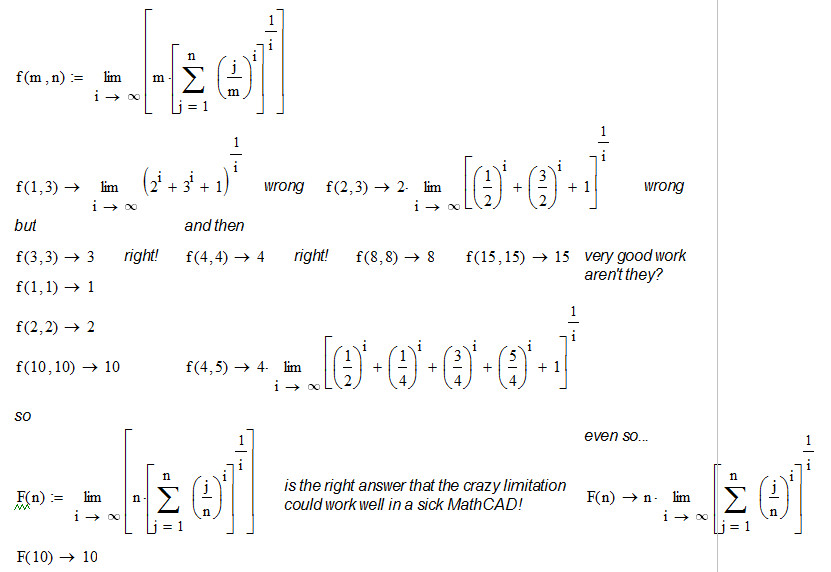Community Tip - Did you know you can set a signature that will be added to all your posts? Set it here! X
- Subscribe to RSS Feed
- Mark Topic as New
- Mark Topic as Read
- Float this Topic for Current User
- Bookmark
- Subscribe
- Mute
- Printer Friendly Page
limit problem in mathcad 15
- Mark as New
- Bookmark
- Subscribe
- Mute
- Subscribe to RSS Feed
- Permalink
- Notify Moderator
limit problem in mathcad 15
I use mathcad 15 M020 to quest the limitation of:
(1+2^n+3^n)^(1/n), n-->infinity
and the answer should be 3, but in mathcad it seem can not calculate it.
and I try it on the Prime M010, false too.
Why? and How should I solve this problem?
My pc system is Win7 ultimate.
Solved! Go to Solution.
- Labels:
-
Other
Accepted Solutions
- Mark as New
- Bookmark
- Subscribe
- Mute
- Subscribe to RSS Feed
- Permalink
- Notify Moderator
- Mark as New
- Bookmark
- Subscribe
- Mute
- Subscribe to RSS Feed
- Permalink
- Notify Moderator
Works fine in MC 15 050...don't know about 010. I used the left hand limit from the toolbar, but all limit directions worked.
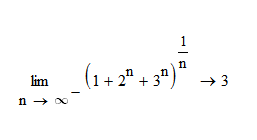
- Mark as New
- Bookmark
- Subscribe
- Mute
- Subscribe to RSS Feed
- Permalink
- Notify Moderator
Harvey Hensley wrote:
Works fine in MC 15 050...don't know about 010. I used the left hand limit from the toolbar, but all limit directions worked.
Guess it is M020.
But crazy effect as I tried it myself, too (MC15 M020), but to no avail. Whats different?
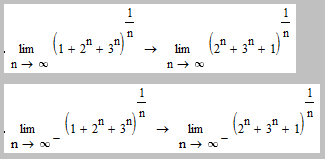
- Mark as New
- Bookmark
- Subscribe
- Mute
- Subscribe to RSS Feed
- Permalink
- Notify Moderator
En, my result is like Werner's.
- Mark as New
- Bookmark
- Subscribe
- Mute
- Subscribe to RSS Feed
- Permalink
- Notify Moderator
Yes, I have tried it with another program (Derive) without problems but I noticed that by adding summands it takes longer and longer to evaluate.
Mathcad only can do it with max. two summands. Could it be a memory problem? I'm working on a machine with just 1 Gig of mem and WinXP.
Or could it have to do with tolerance settings? On the other hand, Mathcad should simplify s(k) to k, I guess.
@Harvey: Could you post your worksheet, please.
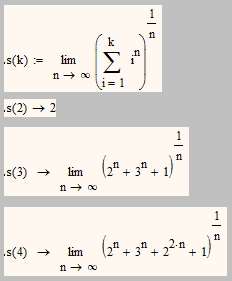
- Mark as New
- Bookmark
- Subscribe
- Mute
- Subscribe to RSS Feed
- Permalink
- Notify Moderator
- Mark as New
- Bookmark
- Subscribe
- Mute
- Subscribe to RSS Feed
- Permalink
- Notify Moderator
hi, harvey
I'm also using win7, but your worksheet can't work too.
I used ask my friend about this problem, he is using winXP and MC15M020, but his answer is right.
Maybe this problem have nothing to do with what pc system you are using.
Zhu Xinyan
- Mark as New
- Bookmark
- Subscribe
- Mute
- Subscribe to RSS Feed
- Permalink
- Notify Moderator
This is not the first time that a MC15 050 worksheet wouldn't work in MC15 010. Notice also that Werner said his 020 would not work, yet your friend, using XP on 020 version, got the answer. This needs to be submitted to the help desk.
- Mark as New
- Bookmark
- Subscribe
- Mute
- Subscribe to RSS Feed
- Permalink
- Notify Moderator
Harvey Hensley wrote:
Here's my worksheet. I'm using Win 7.
And this is what it looks in My Mathcad 15 M020 under Win XP SP3, slow and only 1GB of memory.
I have no explanation for this effect and where the difference could be. It obviously is not a problem with different Mathcad version. BTW, Prime2 M010 would not simplify that limit, too, for me either.
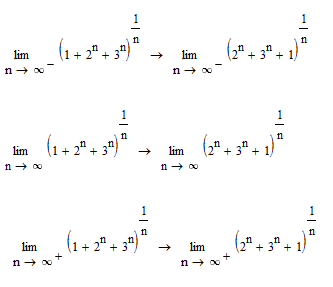
- Mark as New
- Bookmark
- Subscribe
- Mute
- Subscribe to RSS Feed
- Permalink
- Notify Moderator
Here are my results obtained in Win XP SP3 (with 3Gb of memory) in Mathcad 15 M020 and Prime 2.0 M010 (both run with Russian language):
- Mark as New
- Bookmark
- Subscribe
- Mute
- Subscribe to RSS Feed
- Permalink
- Notify Moderator
VladimirN. wrote:
Here are my results obtained in Win XP SP3 (with 3Gb of memory) in Mathcad 15 M020 and Prime 2.0 M010 (both run with Russian language):
Same what I noticed - my first suspect of it being a memory issue I already had to put away. Also the OS seems not to account for as I had the effect on XP and Win7.
So my new vague suspect was, that it could have someting to do with localized versions. But then I can't imageine how and why. And I guess that MC15 and Prime are quite different in that respect and the limit does not evaluate for me even when I run MC15 and Prime in English language mode.
So again - no clue!
- Mark as New
- Bookmark
- Subscribe
- Mute
- Subscribe to RSS Feed
- Permalink
- Notify Moderator
Hi Werner,
This is interesting. How long are you waiting for computing this limit in Mathcad?
- Mark as New
- Bookmark
- Subscribe
- Mute
- Subscribe to RSS Feed
- Permalink
- Notify Moderator
VladimirN. wrote:
Hi Werner,
This is interesting. How long are you waiting for computing this limit in Mathcad?
Not long, 3 seconds I'd guess. Needs more time if summands are added, but again to no avail. Will only evaluate correctly with two summands.
As you can read in the thread it evalautes for most most people (including Valery, who, as I guess, uses a Russian flavored Mathcad) and it does not for three of us (you, Zhu and me) so far.
Those for which it evaluates get wrong result for the same expression with more summands.
- Mark as New
- Bookmark
- Subscribe
- Mute
- Subscribe to RSS Feed
- Permalink
- Notify Moderator
Ok. I will try to test by using the following configurations: Win 7 32-bit with Mathcad 15 M020; Win 7 64-bit with Mathcad 15 F000 and provide my feedback.
- Mark as New
- Bookmark
- Subscribe
- Mute
- Subscribe to RSS Feed
- Permalink
- Notify Moderator
Just tested. By using Win7 32-bit with Mathcad 15 M020 produces the same result as that shown from me above. In Win 7 64-bit with Mathcad 15 F000 I received the following:
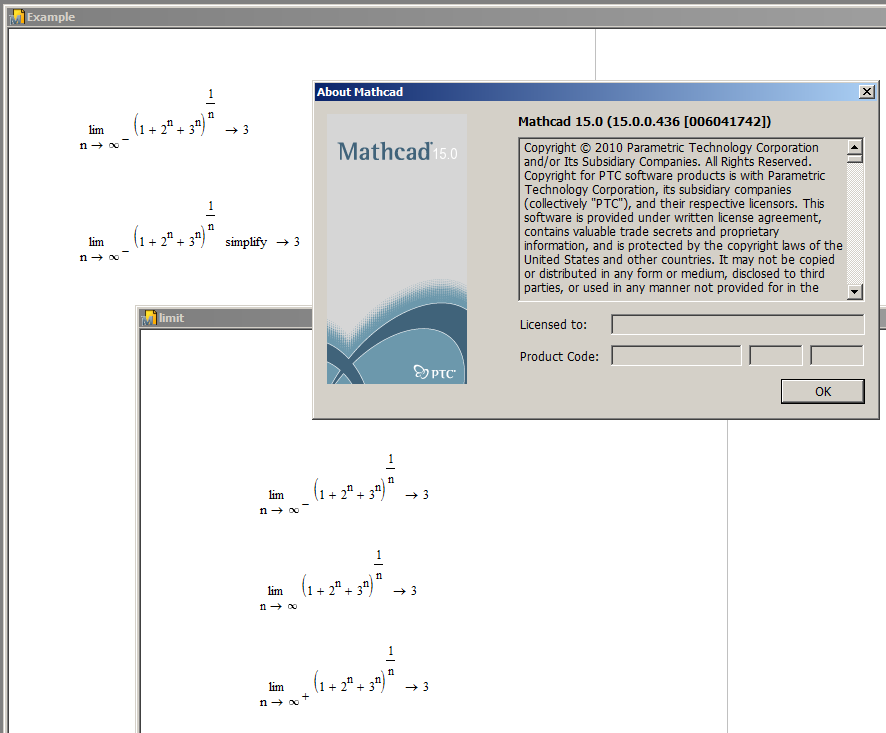
- Mark as New
- Bookmark
- Subscribe
- Mute
- Subscribe to RSS Feed
- Permalink
- Notify Moderator
Crazy! As already stated, on my side every combination does not evaluate the limit
Win XPSP3 & MC15
Win XPSP3 &PRIME2 (32bit)
Win7 64bit & MC15
Win7 64bit & PRIME2 (64 bit)
MC15 is M020
PRIME2 is M010
- Mark as New
- Bookmark
- Subscribe
- Mute
- Subscribe to RSS Feed
- Permalink
- Notify Moderator
M020 service release does not evaluate the limit correctly.
- Mark as New
- Bookmark
- Subscribe
- Mute
- Subscribe to RSS Feed
- Permalink
- Notify Moderator
VladimirN. wrote:
M020 service release does not evaluate the limit correctly.
Not sure about that. Zhu reported from a friend using M020 for whome the limit worked (http://communities.ptc.com/message/199398#199398).
And Harvey told us it works for him with Mathcad 15 050, I guess he meant M020.
- Mark as New
- Bookmark
- Subscribe
- Mute
- Subscribe to RSS Feed
- Permalink
- Notify Moderator
Anyway I sent this issue to PTC's technical support.
- Mark as New
- Bookmark
- Subscribe
- Mute
- Subscribe to RSS Feed
- Permalink
- Notify Moderator
SPR 2172518 (Severity 2 – Business Moderately Impacted) was filed.
- Mark as New
- Bookmark
- Subscribe
- Mute
- Subscribe to RSS Feed
- Permalink
- Notify Moderator
No, it is 005. But it only worked with the original problem with three terms.
- Mark as New
- Bookmark
- Subscribe
- Mute
- Subscribe to RSS Feed
- Permalink
- Notify Moderator
Harvey Hensley wrote:
Works fine in MC 15 050...don't know about 010 ...
Mathcad 15 M020 is the latest service release at this time.
- Mark as New
- Bookmark
- Subscribe
- Mute
- Subscribe to RSS Feed
- Permalink
- Notify Moderator
朱 欣研 wrote:
I use mathcad 15 M020 to quest the limitation of:
(1+2^n+3^n)^(1/n), n-->infinity
and the answer should be 3, but in mathcad it seem can not calculate it.
My studens always check limits with plots. If it is possible!
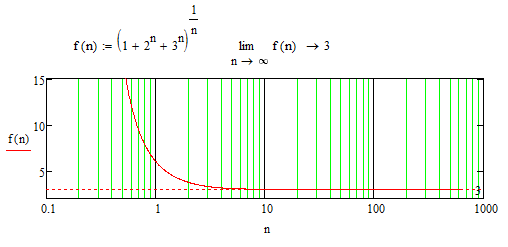
- Mark as New
- Bookmark
- Subscribe
- Mute
- Subscribe to RSS Feed
- Permalink
- Notify Moderator
No, I use your method to plot the f(n), the "n" can not reach 1000, and when I calculate f(1000), it return an error----Trying to caiculate the function, found a number with an order of magnitude greater than 10 ^ 307.
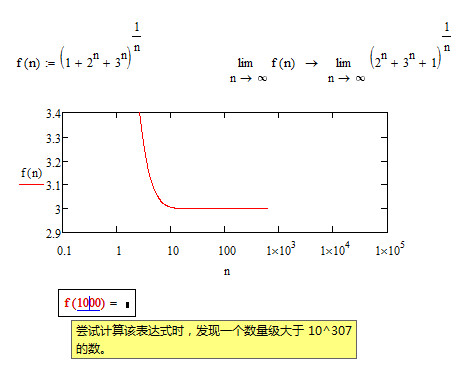
Sorry, my mathCAD' error message is Chinese.
And when I calculate the lim(f(n)) n-->100000, my computer crashed.
It seemly that MC15M020's limit symbolic system isn't work on the right way.
- Mark as New
- Bookmark
- Subscribe
- Mute
- Subscribe to RSS Feed
- Permalink
- Notify Moderator
Another interesting scene, from the plot I can assume that when f`(n)=0, the f(n) is on the limit point.
and...
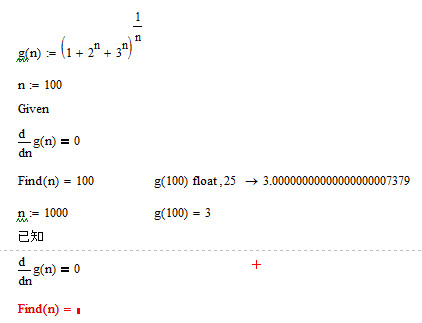
The error message is "The variable is undefined".
and then I try to find the maximum of n:
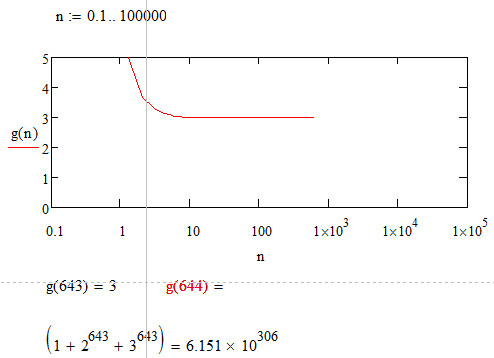
It seems that the limitation symbolic calculation has used a numerical calculation method.
- Mark as New
- Bookmark
- Subscribe
- Mute
- Subscribe to RSS Feed
- Permalink
- Notify Moderator
朱 欣研 wrote:
It seems that the limitation symbolic calculation has used a numerical calculation method.
No, the symbolics is never using the Mathcad numerics and so does not face that limit of 10^307.
There must be something else going on with the symbolic failing for the two of us and working for the rest (so far).
- Mark as New
- Bookmark
- Subscribe
- Mute
- Subscribe to RSS Feed
- Permalink
- Notify Moderator
Valery Ochkov wrote:
朱 欣研 wrote:
I use mathcad 15 M020 to quest the limitation of:
(1+2^n+3^n)^(1/n), n-->infinity
and the answer should be 3, but in mathcad it seem can not calculate it.
My studens always check limits with plots. If it is possible!
Valery, it seems that you missed the point of this thread (being that Mathcads symbolic on some combination of version,OS,memory, or whatever, fails to evaluate that limit to 3. As I see from your screenshot it works in your installation, while it does not in others.
- Mark as New
- Bookmark
- Subscribe
- Mute
- Subscribe to RSS Feed
- Permalink
- Notify Moderator
I'm have Windows 7 home edtion 4GB ram ,Mathcad 15.0 (15.0.0.436 [006041742]) version and Mathcad Prime 2 F000 (2012.02.17.RC06/2.0.0.176). Work fine to me.![]()
- Mark as New
- Bookmark
- Subscribe
- Mute
- Subscribe to RSS Feed
- Permalink
- Notify Moderator
That's a confusing phenomenom. Does it work for you with more than three summands? I think if you add more and more summands Mathcad will fail eventually. I don't think its able to simplify s(k) to k, right?
As far we have three for which it works (Harvey, Valery, Jan) and two for which it doesn't the original poster and me).
How far (speaking of k) can you go with the value of k until MC fails?
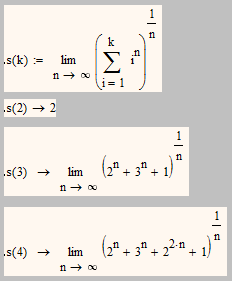
- Mark as New
- Bookmark
- Subscribe
- Mute
- Subscribe to RSS Feed
- Permalink
- Notify Moderator
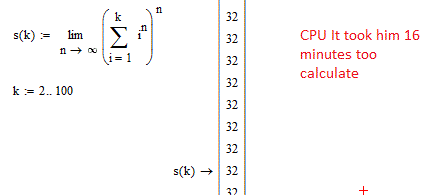
For k = 100 the result is, but the larger k this requires greater computing power (large CPU time) and that's why I do not know when mathacad not calculate this.

